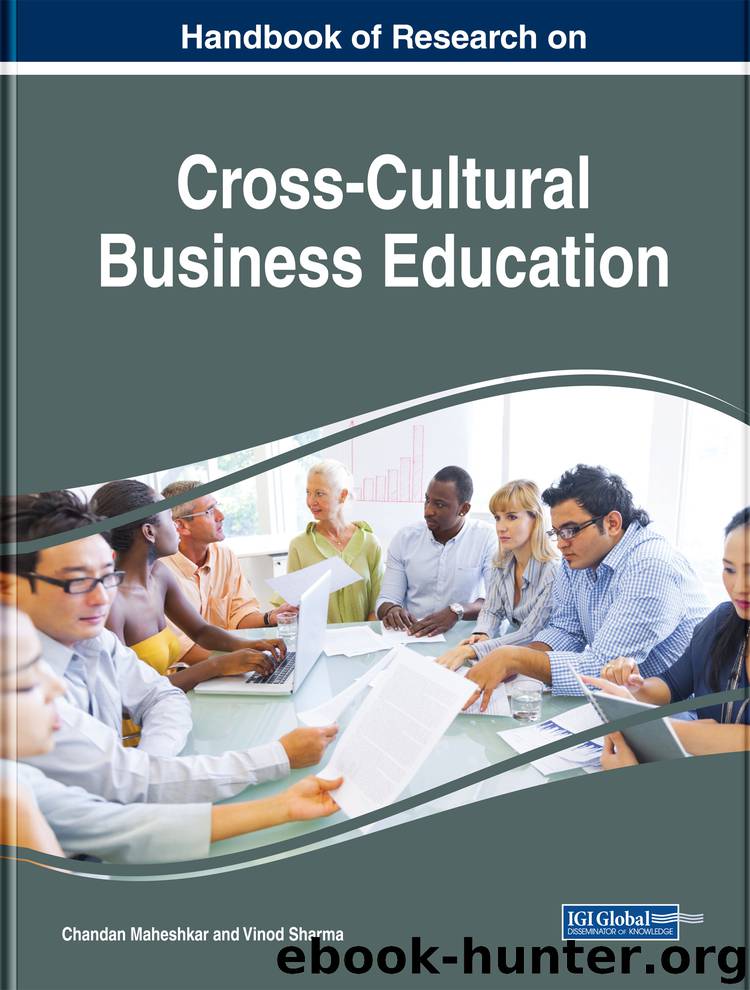Handbook of Research on Cross-Cultural Business Education by Chandan Maheshkar Vinod Sharma

Author:Chandan Maheshkar,Vinod Sharma
Language: eng
Format: epub
Publisher: IGI Global
Hofstede (1980) defines culture as “the collective programming of the human mind that distinguishes the members of one human group from those of another” (p. 24). Culture is generally developed over an extended period of time, and is based on normative behaviors, rules, attitudes and values, beliefs, feelings, patterns of thought, customs, symbols, and role expectations in work, home, and other walks of society (Henderson et al., 1992). National culture reflects the shared cultural meaning system of members of a certain country (Betancourt & López, 1993; Rokeach, 1968). Most countries contain a number of subcultures (Henderson et al., 1992; Hofstede, 1980, 2001), such as in different geographical regions (e.g., urban versus rural areas, or topographies such as North versus South, etc.). However, these are likely to identify strongly with “dominant national character traits” (Hofstede, 1980, p.29) that derive out of their shared nationality, and commonalities in historical-social circumstances (Beehr & Glazer, 2001).
The theory of culture’s consequences proposes that enduring national values which shape organizational behavior differ between countries (Hofstede, 2001). Moreover, from an organizational behavior perspective, shared cultural characteristics in a given country are generally thought to outweigh the characteristics of any single organization within it (Adler, 1990). This relative isomorphism is likely to result in national cultural characteristics being stronger than inherent cultural differences across organizations within a given nation (Erez, 2011). Thus, the importance for business educators, researchers and practitioners to understand cross-cultural differences, and the psychological mechanisms that underpin them, cannot be overstated.
MAJOR THEORETICAL FRAMEWORKS OF NATIONAL CULTURE
Download
This site does not store any files on its server. We only index and link to content provided by other sites. Please contact the content providers to delete copyright contents if any and email us, we'll remove relevant links or contents immediately.
Weapons of Math Destruction by Cathy O'Neil(6267)
Cracking the GRE Premium Edition with 6 Practice Tests, 2015 (Graduate School Test Preparation) by Princeton Review(4285)
What It Really Takes to Get Into Ivy League and Other Highly Selective Colleges by Hughes Chuck(3752)
Fooled by Randomness: The Hidden Role of Chance in Life and in the Markets by Nassim Nicholas Taleb(3108)
The Tyranny of Metrics by Jerry Z. Muller(3065)
The Marketing Plan Handbook: Develop Big-Picture Marketing Plans for Pennies on the Dollar by Robert W. Bly(3057)
Ultralearning by Scott Young(2946)
The Official Guide for GMAT Review 2015 with Online Question Bank and Exclusive Video by Graduate Management Admission Council (GMAC)(2799)
Bull by the Horns: Fighting to Save Main Street From Wall Street and Wall Street From Itself by Sheila Bair(2678)
50 Economics Classics by Tom Butler-Bowdon(2568)
The Visual MBA by Jason Barron(2153)
Data Science for Business by Foster Provost & Tom Fawcett(1969)
The Inevitable by Kevin Kelly(1968)
Cracking the LSAT, 2012 Edition by Princeton Review(1947)
Out of the Crisis by Deming W. Edwards(1894)
GMAT Official Guide 2018 Verbal Review by GMAC (Graduate Management Admission Council)(1860)
The Personal MBA: Master the Art of Business by Josh Kaufman(1824)
The Conflict Resolution Phrase Book by Barbara Mitchell & Cornelia Gamlem(1774)
Maths and Stats for Web Analytics and Conversion Optimization by Himanshu Sharma(1701)
